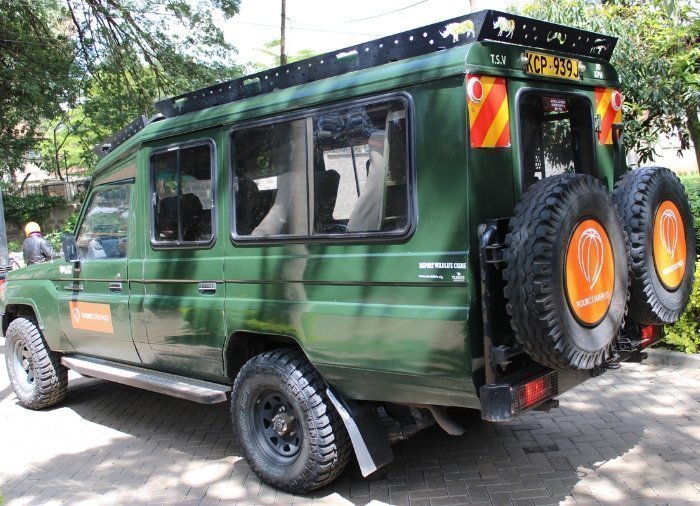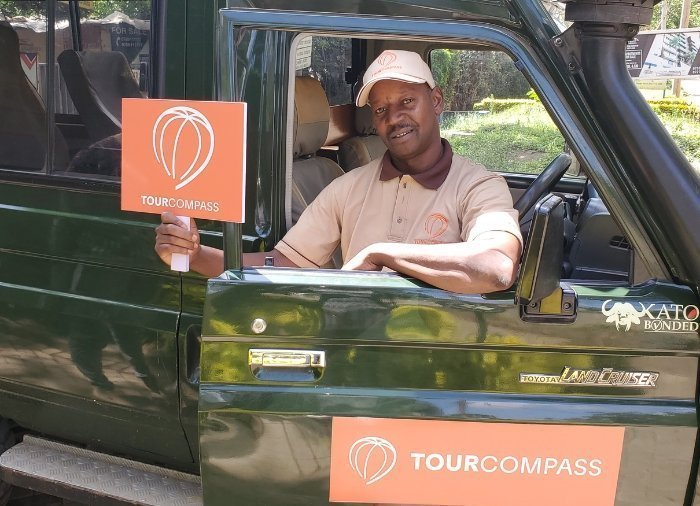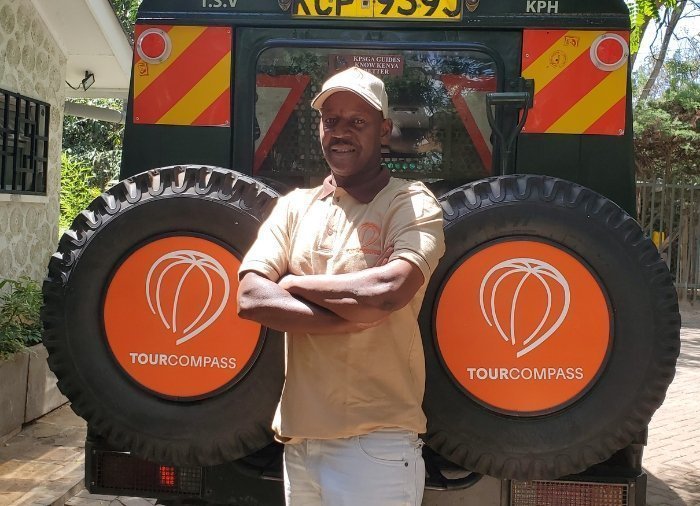You can go on safari in Kenya all year round.
January, February and March
All 3 months are good safari months, when, right after the short rainy season, you can enjoy a lot of birds on a winter visit from Europe. The grass is not that high, making it is easy to see the animals. You’re in with a good chance of seeing large herds of elephants.
April and early May
This is usually the “big” rainy season. The rain usually falls as heavy showers, which, however, usually only last a few hours. The rain typically freshens up the landscape, and the heavy clouds can make for a wonderfully dramatic sky!
Late May and June
These are good safari months. Right after the big rainy season, everything grows beautifully. At the end of June, the large herds of zebras from Tanzania begin to arrive in the Masai Mara, preceding the great migration. The zebras come to eat the coarse grass.
July, August, September and the first half of October
The huge herds of wildebeest are starting to come from the south. The wildebeest start their return migration to Tanzania in September/October.
November and December
Calm gently descends over the savannah. There is normally now a small rainy season, which freshens everything up after all the wildebeest have left the area. The grass starts to grow, and the elephants return.
| Weather statistics | JAN | FEB | MAR | APR | MAY | JUN | JUL | AUG | SEP | OCT | NOV | DEC |
| Rainfall (mm) | 58 | 50 | 92 | 242 | 190 | 39 | 18 | 24 | 31 | 61 | 150 | 108 |
| Rainfall (days) | 4 | 4 | 8 | 15 | 13 | 5 | 3 | 4 | 4 | 7 | 14 | 9 |
| Daytime temperature | 26 | 27 | 27 | 25 | 24 | 23 | 22 | 23 | 25 | 26 | 24 | 24 |
| Night-time temperature | 11 | 11 | 12 | 13 | 12 | 10 | 9 | 9 | 10 | 11 | 13 | 12 |
| Hours of sunshine | 288 | 266 | 267 | 204 | 189 | 159 | 130 | 127 | 180 | 226 | 198 | 257 |
It goes without saying that you need to bring your passport with you on your tour. It must be valid for at least 6 months after entering Kenya, and there must be at least one blank page in the passport.
You do not need a visa to enter Kenya.
However, you must apply for an electronic approval (eTA) to be permitted to enter Kenya. Please apply for it here: https://www.etakenya.go.ke/.
The price for the ETA is USD 30, and payment is made by credit card.
All visitors must apply for an eTA – including children. If you are travelling as a family with children under the age of 18, it is a good idea to apply for a family eTA as this way you only have to fill in one eTA for the whole family.
You must apply no later than three days and no earlier than three months before departure. You should expect it to take around three days for your application to be reviewed and for you to receive a response.
The following information is required to apply for an eTA:
- Valid passport
- Passport photo or passport photo-style selfie
- Contact details
- Travel information: flight number and travel dates as well as itinerary
- Yellow fever vaccination certificate (if necessary)
- Credit card
You will receive your approval by email, and it should be printed out and presented with your passport on your arrival in Kenya.
If you have any problems or questions regarding the electronic eVisa, we refer you to this e-mail address: support@etakenya.go.ke or to the Kenya High Commission in London.
The visa regulations can be checked on Foreign, Commonwealth & Development Office website.
If you are a British citizen and you have booked a tour to Kenya with a beach holiday in Zanzibar (Tanzania), you are required to have a visa for Tanzania. Please visit our Practical Information on Tanzania page for information on how to apply for a visa to Tanzania.
Before your departure, you will be sent some travel documents containing important information, which we recommend that you print out and bring with you on your tour. You will, for example, receive your travel itinerary as well as the telephone numbers of our local partners at the destination, allowing you to get in touch with them if you need help along the way.
We recommend that you download the WhatsApp app to your smartphone and add the phone numbers of our business partners. You can send messages and call them for free using the app when you have a Wi-Fi connection.
We recommend that you contact a medical specialist, your GP or an authorised vaccination clinic for information about vaccinations. You can also read more about the rules regarding travel vaccinations here.
Please be aware of the rules about yellow fever – especially if you are entering via another country where yellow fever is present. Some countries require proof of yellow fever vaccination upon entry. Your vaccination certificate should therefore always be carried with you in your hand luggage when you travel.
There is currently no Covid-19 vaccination requirement for entry into Kenya. However, these rules may change at short notice. It is your responsibility to check these rules before departure.
Please note that certain Covid-19 rules may apply at the stopover airports on your way to/from Kenya. It is also your responsibility to check this before departure.
You’re always very welcome to contact us if you have any questions about this.
Please read our general travel terms and conditions carefully, as these are part of the agreement terms for tours purchased at TourCompass. Tours purchased from us are covered under the “Package Travel Act”.
Click here to read our travel terms and conditions.
All the flights and flight-inclusive holidays on this website are financially protected by the ATOL scheme. When you pay you will be supplied with an ATOL Certificate. Please ask for it and check to ensure that everything you booked (flights, hotels and other services) is listed on it.
Please see our booking conditions for further information or for more information about financial protection and the ATOL Certificate click here.
We always advise you to obtain comprehensive travel insurance when heading off on your dream holiday. It is also highly recommended to acquire cancellation insurance for extra protection.
Click here to proceed to our page on insurance, where you can read more about our recommendations.
The local currency in Kenya is called the Kenyan shilling (KES).
We recommend that you exchange to shilling at the airport or withdraw some cash on your arrival in Kenya.
It is also possible to pay in USD (most common), euro and pounds sterling in Kenya. Make sure that your dollar bills are newer ones (dated after 2009) and that they are “neat” (not too crumpled). Otherwise you run the risk of them being rejected by the shop/hotel.
We recommend that you carry a small amount with you (1–5-dollar bills). You can also withdraw cash using Visa and MasterCard and pay by card in some places.
Tips
In Kenya, it is customary to tip guides, waiters and other service personnel. Give your tips personally and always have a little change in your pocket for tipping. It is, of course, up to you how much you wish to pay.
As a rule of thumb, you can reckon on the following:
- 10-15 USD per person per day to the guide
- 2 USD for luggage which the porter carries for you
- 10% in bars and restaurants
- 2 USD a day for the maid
We recommend that you tip your guide/driver at the end of your tour – preferably in a sealed envelope.
At the vast majority of our destinations, we are able to take allergies, as well as allergens or preferences into account when it comes to food, however it is important that you inform us of this when you book the tour.
Most hotels and lodges receive electricity from their own generators. The standard voltage is 240 V and 3-pin plugs are used. Please be aware that there is not always sufficient power to use a hair dryer, for example.
In the hotel descriptions on our website, you can see whether Wi-Fi is available at the hotels. Please note that the connection may be unstable.
Make sure you pack all your important and indispensable things in your hand luggage. This applies to items such as passports, visas, vaccination cards, travel documents, insurance documents, credit cards, money, computers, mobile phones and cameras, as well as information about your health and vital medicines.
We recommend that you pack your things in soft bags when going on a safari holiday. It’s easier to pack the safari cars with soft bags than suitcases. Hardcase suitcases are particularly difficult to fit in to the safari car. So, if possible, avoid using suitcases with hard edges.
We also recommend that you pack light clothes for the safaris and that you avoid bright colours where possible. Bring long trousers and long sleeved shirts that protect against mosquitoes after sunset and, if necessary, against the sun during the day. Avoid bare feet and legs in the evening due to the mosquitoes.
Remember to bring a small torch and extra batteries in case of the occasional power cut.
Please note that all use, import and production of plastic bags, such as those we know from supermarkets, etc., is prohibited in Kenya. We therefore recommend that you avoid using plastic bags when packing your luggage. Use fabric bags instead, or bags made of a waterproof material other than plastic.
Visitors are not permitted to bring plants, seeds, fruit and other plant products into the UK from their travels outside the UK, unless they are accompanied by a plant health (phytosanitary) certificate. These rules also apply to smaller quantities of plants and plant products.
Read more about the rules here.
Please note that this tour is not generally suitable for people with impaired mobility. Please contact us for information about your options in relation to your specific needs.
Most airlines have electronic tickets (e-tickets).
It is important that you check your name for spelling errors, as the name on the reservation must be exactly as it appears on your passport. If your name needs to be corrected, please contact us as soon as possible. Please note that this may incur a fee from the airline.
The airline will assign you a seat on the plane at check-in. If you have specific wishes regarding where you sit on the plane, you can make a seat reservation yourself on the airline’s website or in their app. Please note that most airlines require payment for a seat reservation.
It varies when airlines open for seat reservations, but as a general rule, you can book seats from the time of booking and up to 48 hours before departure.
We also point out that the airline has complete control over all seats on the plane and that they are therefore entitled to make changes to the reservation at any time.
If you do not make a seat reservation before departure, the airline will assign you a seat at check-in.
Your passport and your booking reference, which appears on your itinerary, are required to check in.
We recommend that you download the airline’s app on your phone. In the app, there is an option for online check-in, which typically opens 24 to 48 hours before departure. The app also allows you to stay informed of any flight changes and other important information about your flight.
Please note that the flight times may have changed in relation to those listed on the travel itinerary you received when you booked your holiday. It is always the flight times in the airline’s app or on the airline’s website that apply.
We recommend that you arrive at the airport to check in at least two hours before departure. It is a good idea to check the airport’s website for the latest updates.
We use many different airlines for our destinations. You can check the exact rules for hand luggage and checked baggage on the airline’s website or in their app.
If you are taking a domestic flight in Kenya, you should be aware that the maximum baggage allowance in the checked-in suitcase is 15-20 kg and the maximum hand luggage allowance is 5 kg. Please note that you are not usually permitted to bring a trolley bag as carry-on, as the planes do not have space for them in the overhead compartments above the seats.
If, for example, you are visibly carrying hand luggage in plastic bags upon your arrival in Kenya, you will be asked to hand them in. This also includes plastic bags from “Duty Free”.
If your baggage is delayed, please contact the staff in the baggage reclaim area to report your missing baggage.
It is important that you have your baggage receipt when completing your PIR (Property Irregularity Report).
Please note that you must not leave the baggage area at the airport until you have completed the report.
In the event of delayed baggage, we ask you to contact our partner, who will ensure that your guide/driver waits for you.
Should any changes occur in connection with your flight reservation before departure, we will of course contact you to let you know.
Should your flight be delayed after check-in, the airline is responsible for rebooking your flight. They will typically book the next possible flight and arrange any meals and accommodation if necessary.
Our partner checks for any changes in arrival times and will naturally still wait for you, even if your flight is delayed.
If, due to a delay or cancellation, the airline books you on another flight number after you have arrived at the airport, please contact us on TourCompass’ emergency number.
Immigration:
When you arrive at your final destination, you will go through immigration, where your passport and any entry documents and visas are checked. In many places, you will be required to provide fingerprints, and a photo of your face will also be taken for biometric recognition. You may also be asked questions about your travel plans in the country and possibly where you are staying.
You will be required to complete arrival and departure forms. Remember to bring a pen with you! Under the section where you have to fill in your address in Kenya, you should write the name of the first hotel/lodge where you will be staying.
Customs:
Once you’ve cleared immigration and picked up your luggage, you will head through customs. If you have nothing to declare, you can go through “nothing to declare”. If, on the other hand, you have something to declare, it is important that you go through “declare”. It’s your own responsibility to check the customs regulations that apply in the country you are travelling to.
Before you leave the airport, all luggage must be scanned – including your hand luggage. This is standard procedure in Kenya.
On your arrival, you will be met by a guide/driver who will be ready to welcome you with a TourCompass sign.
The guide will usually be standing outside the arrivals hall in an area designated for guides. There may be a little waiting time until all the guests have arrived.
If you don’t spot the guide in Nairobi right away, wait at Paul’s Cafe (Terminal 1A – KLM and Ethiopian Airlines) or Costa Café (Terminal 1E – Emirates, British Airways, Lufthansa and Turkish Airlines)
In the unexpected event that you cannot find your guide/driver, please contact our partner on the emergency number which appears on the travel documents.
Normal check-in is typically from 2 pm, and you cannot therefore count on getting your room earlier. If you’d like to check in early, this can be arranged for a fee when you book the tour.
When you check in, the receptionist will generally register your credit card and may reserve an amount. This is not an additional fee, but customary at hotels to ensure payment of any consumption from the minibar and the like. When you check out, the amount will be automatically released if you have not made use of this.
It is very normal for hotels to take a copy of your passport. In some places, this is a requirement of the local authorities.
Check-out is normally by 10 am. If you’re not travelling until the afternoon or evening, you can have your luggage stored until it’s time to leave. If you would like a late check-out instead, this can be arranged for a fee when you book the tour.
Driving distances
Nairobi – Amboseli: approx. 250 km, approx. 4–5 hours
Nairobi – Samburu: approx. 320 km, approx. 6 hours
Nairobi – Lake Naivasha: approx. 110 km, approx. 3 hours
Samburu – Lake Naivasha: approx. 340 km, approx. 6–7 hours
Amboseli – Lake Naivasha: approx. 350 km, approx. 6–7 hours
Lake Naivasha – Masai Mara: approx. 250 km, approx. 4–6 hours
Masai Mara – Nairobi: approx. 265 km, approx. 6–7 hours
Mombasa – Tsavo: approx. 120 km, approx. 3 hours
Tsavo – Amboseli: approx. 290 km, approx. 4 hours
Amboseli – Tsavo: approx. 110 km, approx. 2 hours
Tsavo – Mombasa: approx. 280 km, approx. 5–6 hours
Remember all distances and times are approximate and subject to weather and traffic conditions. Please note that the standard of roads in Kenya cannot be compared with the roads in Northern Europe.
Safari in 4-wheel drive Land Cruisers
We continuously invest, together with our partners in Kenya, in new 4-wheel drive Land Cruisers, so all our guests can always enjoy the best safari experience in Tour Compass’ own cars.
Most of the cars are equipped with power outlets, so you can charge your phone or your camera while you drive (remember to bring an adaptor), and Wi-Fi is available in all cars in areas where the signal is strong enough – just ask your driver. Binoculars are also available in all the cars.
The cars have the option to open the roof for a better view of the exciting animal life. There can be up to 5-7 people in one Land Cruiser.
It is possible to reserve a private Land Cruiser for an additional fee. Contact us for more information on this.
In the event of unforeseen circumstances such as bad weather, blocked roads or otherwise, it may be necessary to change the order of sightseeing tours and attractions in your itinerary.
We have a 24-hour emergency hotline so that you can always get in touch with us should anything unforeseen occur during your tour. You will also be sent the telephone numbers and emergency telephone numbers of our partners at the destination. In some cases, it may be easiest and fastest to contact our partners due to time differences, if, for example, you find yourself in a situation where your pick-up for an excursion or transfer is more than 15 minutes delayed.
Our livelihood depends on satisfied guests, and we would therefore very much like to hear from you after your return home. Send us an email at info@tourcompass.co.uk or call us on tel.: 01279 704 135.






